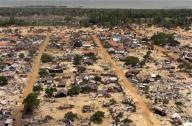 A Western-led push for a war crimes probe into Sri Lanka’s war to destroy the Tamil Tigers is motivated by a "hidden agenda" to oust President Mahinda Rajapaksa’s government, the island nation’s defence secretary said Thursday.
A Western-led push for a war crimes probe into Sri Lanka’s war to destroy the Tamil Tigers is motivated by a "hidden agenda" to oust President Mahinda Rajapaksa’s government, the island nation’s defence secretary said Thursday.
Defence Secretary Gotabaya Rajapaksa, the architect of Sri Lanka’s destruction of the separatist Tamil Tigers in 2009 and the president’s younger brother, also expressed frustration that post-war rehabilitation efforts were being ignored.
Sri Lanka’s military crushed the Tamil Tigers to decisively end one of Asia’s longest-running modern wars in May 2009, but since the waning months of the conflict the government has been under increasing pressure over accusations of civilian deaths.
A panel commissioned by the U.N. secretary-general in April said it had "credible evidence" both sides had committed possible war crimes, and in particular alleged the government had killed thousands of civilians.
"There is a hidden agenda behind these allegations. Their main requirement is to change the president and the government who are not fulfilling their desires," Gotabaya Rajapaksa told a forum organised by the Federation of National Organizations.
The United States and Britain have been at the fore of a call for an independent probe into the allegations, which Sri Lanka says first emanated from the Tamil Tigers’ well-funded overseas propaganda arms and are false.
"No matter what we do there is no end to these allegations," he said.
The defence secretary has since 2009 acknowledged civilian deaths occurred, but rejects claims that tens of thousands were killed.
Casualty figures were routinely inflated by the Tigers. At the end of the war, the separatists kept some 300,000 people as human shields and had in the past used the threat of civilian harm to win ceasefires when they were at a military disadvantage.
There has been no definitive independent count of civilian deaths. An internal U.N. tally of around 7,000 deaths in the final months was leaked to the media during the war, but the world body later disavowed the figure as unconfirmed.
"We have proved that these figures they are talking about are wrong and cannot be justified. After the conflict, we have attended to most of the post-war challenges," he said.
Rajapaksa said the government had resettled nearly 300,000 displaced people, carried out de-mining, rehabilitation of former Tamil Tiger fighters and held democratic elections in the former war zone, evidenced by the fact the government lost to a the Tamil Tigers’ former political proxy in some areas.
The government earlier this month released its own analysis of the war, which challenged the U.N.-sponsored report’s findings and argued the military used only the necessary force required to defeat a well-armed enemy.
(For updates you can share with your friends, follow TNN on Facebook and Twitter )
